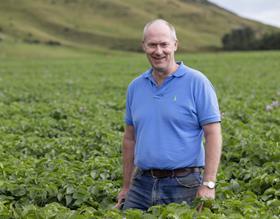
The British seed potato industry’s assurance scheme has been updated to cover areas such as closer monitoring of water use and crop storage.
Administered by Red Tractor, the UK’s largest food standards scheme, Safe Haven protects against any pest or disease that can be imported or introduced by seed.
In total eight amendments to the Safe Haven certification scheme are coming into force on 1 October. These include water use, tools, and equipment, transport, contracted or shared machinery, grading and packing, storage, and traceability.
The scheme will also now cover the disease Brown Rot and pest Epitrix, in addition to the existing coverage of Ring Rot and Dickeya.
The three key areas of emphasis in the updated standards are as follows:
1. Enhanced traceability controls to allow for informed decisions to be made and to flush disease-affected stock out of the system.
2. Water: identified as a key vector for the transfer of bacterial pathogens, particularly Brown Rot and Dickeya species. While irrigation of seed potatoes is relatively unusual, selection and management of water is a key risk-reduction step.
3. Seed storage: identified as an important element of the process and an area of particular risk. The new Safe Haven requirements are complemented by the AHDBseed storage guide,which is available on the AHDB website.
Patrick Hughes, head of export trade development at AHDB, said: “We welcome these changes as they reinforce the value of the scheme in supporting individual businesses and the long-term health of the British potato industry, and protecting the global reputation of British seed potatoes.
“It is important to regularly review the standards to ensure they are fit for purpose and keep pace with the changing environment we operate in.”
AHDB stressed that the seed potato sector is important for the British potato industry as a whole since seed potatoes are a valuable export commodity.Seed and fresh potatoes exported from the UK between July 2019 and June 2020 were worth just under £113 million, with seed potatoes representing a large proportion of this figure.
Hughes added: “Wework closely with important export destinations for British seed and know that our customers in countries such as Egypt, Israel and Thailand recognise the standards and the security Safe Haven offers.
“Safe Haven has always been an extremelyimportant export tool and it will play an increased role after the transition period for exiting the EU ends, safeguarding existing markets and helping us to develop future opportunities with international markets.”
AHDB worked with Red Tractor, the James Hutton Institute and Fera to review andupdate the Safe Haven scheme, resulting in the eight amendments. The Safe Haven standards are regularly reviewed to ensure they offer practical protection for growers.
AHDB carried out an industry survey in 2019 to ask seed potato growers what they wanted from the scheme and the fourthversion of the standards that come into effect on 1 October is in response to this feedback.
Robert Doig, director of Caledonia Potatoesand a member of the Safe Haven scheme, said: “The Safe Haven certification scheme offers growers and their customers' valuable backstop insurance. It provides the reassurance that the seed they purchase will be healthy and disease-free and is globally recognised as being a guarantee of quality assurance.”
Enjoyed this free article from Fresh Produce Journal and its team of editors? Don’t miss out on even more in-depth analysis, plus all the latest news from the fresh produce business. Subscribe now to theFresh Produce Journal.



